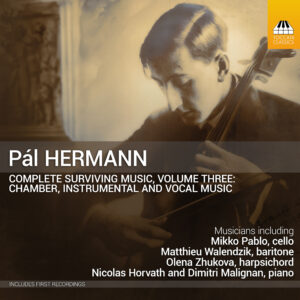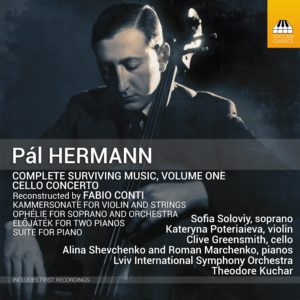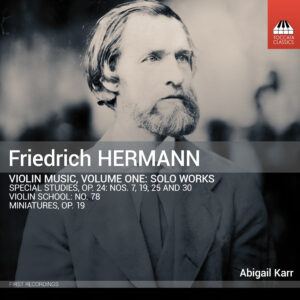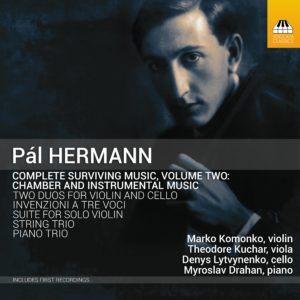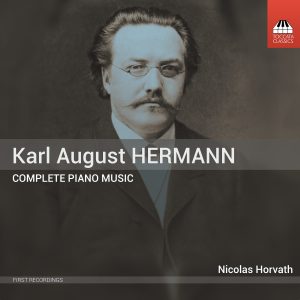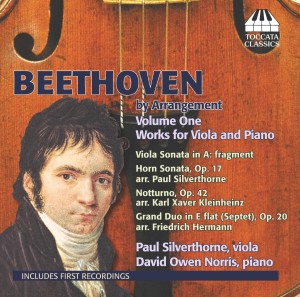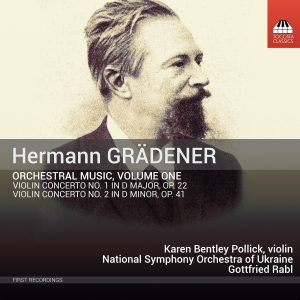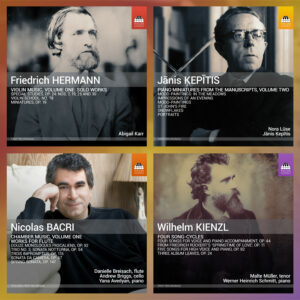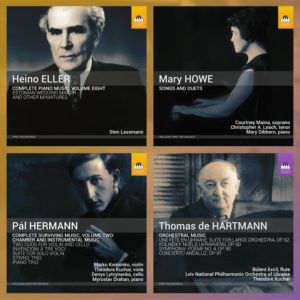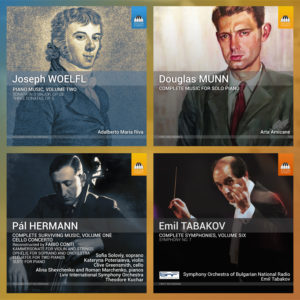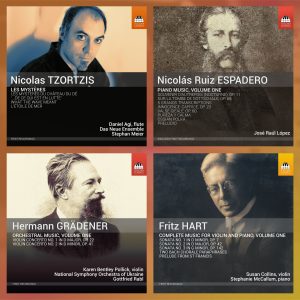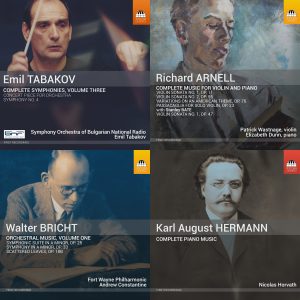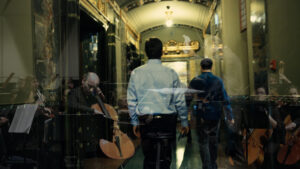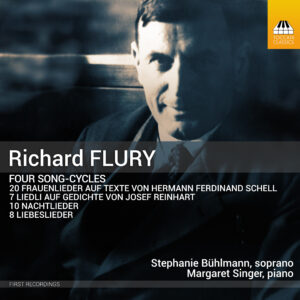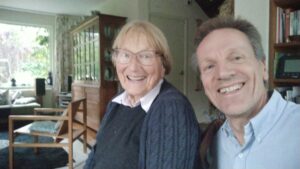Search Results for "Hermann"
Pál Hermann: Complete Surviving Music, Volume Three – Chamber Instrumental and Vocal Music
Pál Hermann, born in Budapest in 1902, was not only one of the leading cellists of his generation; he was also an important composer, one of the major figures in Hungarian music in the generation after his teachers Bartók and Kodály. But since only two of his works were published before his early death – in 1944, at the hands of the Nazis – and many more of them were lost, he has not had the esteem that he deserves. The kaleidoscopic variety of the works on this third, and final, volume of his surviving compositions – biting Bartókian piano pieces, Neo-Baroque essays of considerable contrapuntal ingenuity, songs with a French Impressionist flavour, even a sly transcription of a foxtrot – underlines how much was lost with his murder.
Nicolas Horvath, piano
Dimitri Malignan, piano
Elizaveta Agrafenina, soprano
Sára Gutvill, mezzo-soprano
Irina Bedicova, mezzo-soprano
Paul van Gastel, tenor
Pierre Mak, baritone
Matthieu Walendzik, baritone
Reine-Marie Verhagen, soprano recorder
Inês d’Avena, alto recorder
Dante Jongerius, tenor recorder
Punto Bawono, Baroque lute
Olena Zhukova, harpsichord
Olena Matselyukh, organ
Jean-Pierre Dassonville, horn
Sadie Fields, violin
Mikko Pablo, cello
Pál Hermann: Complete Surviving Music, Volume One
Pál Hermann, born in Budapest in 1902, was not only one of the leading cellists of his generation: he was also an important composer, one of the major figures in Hungarian music in the generation after his teachers Bartók and Kodály. But since only two of his works were published before his early death, in 1944, at the hands of the Nazis, and many more of them were lost, he has not had the esteem that he deserves. This series will present all his surviving compositions, most of them in first recordings. The major work on this first album, Hermann’s Cello Concerto of 1925 in a reconstruction by the Italian composer Fabio Conti (b. 1967), sits somewhere between Bartók and Korngold and bids fair to become a staple of the cello repertoire.
Clive Greensmith, cello (Tracks 1-5)
Kateryna Poteriaieva, violin (Tracks 6-9)
Alina Shevchenko, piano (Tracks 10-13)
Roman Marchenko, piano (Track 10)
Sofia Soloviy, soprano (Track 14)
Lviv International Symphony Orchestra (Tracks 1-9, 14)
Theodore Kuchar, conductor (Tracks 1-9, 14)
Friedrich Hermann: Violin Music, Volume One – Solo Works
The German violinist, violist and composer Friedrich Hermann (1828–1907) spent the six decades of his adult life teaching at the Leipzig Conservatoire and, although his works include a symphony, a string quartet and numerous other chamber pieces for strings, by far the largest part of his output is pedagogical in nature. But he pumped his teaching pieces full of imagination, as the studies here demonstrate. Even though the twenty Miniatures published in 1881 are intended for student violinists, many of them are tiny tone-poems intended both to engage the attention of their players and challenge their techniques – and their mix of poetry and humour should also appeal to adult listeners.
Abigail Karr, violin
Pál Hermann: Complete Surviving Music, Volume Two
Pál Hermann, born in Budapest in 1902, was not only one of the leading cellists of his generation; he was also an important composer, one of the major figures in Hungarian music in the generation after his teachers Bartók and Kodály. But since only two of his works were published before his early death – in 1944, at the hands of the Nazis – and many more of them were lost, he has not had the esteem that he deserves. The works on this second volume of his surviving compositions – here mostly chamber works for strings, several in their first recordings – have the wiry humour, sprung and spiky rhythms and Hungarian melos that mark him out as a worthy successor to Bartók – and hints at how much was lost with his murder.
Marko Komonko, violin
Theodore Kuchar, viola (Tracks 9, 10, 15)
Denys Lytvynenko, cello (Tracks 1–3)
Myroslav Drahan, piano (Track 16)
Karl August Hermann: Complete Piano Music
Linguist, journalist, composer, choir-leader, songwriter, historian, literary philologist and encyclopaedist, Karl August Hermann (1851–1909) has long been recognised as one of the founder-figures of Estonian national awakening in the second half of the nineteenth century. But in spite of his cultural and historical significance, his output of piano pieces has been overlooked until now. This first recording reveals them to be charming miniatures, blending echoes of Chopin and Grieg with the essence of Estonian folksong.
Nicolas Horvath, piano
Beethoven by Arrangement, Volume One
Although a violist himself, Beethoven left nothing for the viola — except for the fragment of a sonata recorded here for the first time. So his contemporaries and successors have 'helped' him fill the gaps: it was Karl Xaver Kleinheinz (1765-1832) who arranged the String Trio, Op. 8, gaining Beethoven's reluctant approval; and a later musician, Friedrich Hermann (1828-1907), transformed the Septet, Op. 20, into an ambitious viola sonata. And now Paul Silverthorne, Principal Viola of the London Symphony Orchestra, expands the repertoire with his own transcription of the Horn Sonata, Op. 17.
Paul Silverthorne, viola
David Owen Norris, piano
Hermann GRÄDENER: Orchestral Music, Volume One
The German-born, Vienna-based Hermann Grädener (1844–1929) is yet another composer whose music, esteemed in its own time, has since slipped between the floorboards of history. Yet this first recording of his two violin concertos – substantial works both, downstream from Brahms, and with a hint of Sibelius – prove him to have been one of the more important Romantics, with a strong sense of drama, a sure hand for musical architecture and a natural flair for extended melody.
Karen Bentley Pollick, violin
National Symphony Orchestra of Ukraine
Gottfried Rabl, conductor
August 2024 Bundle
Included in this bundle:
March 2024 Bundle
Included in this bundle:
February 2022 Bundle
Included in this bundle:
April 2021 Bundle
Included in this bundle:
November 2019 Bundle
Included in this bundle:
September 2018 Bundle
Included in this bundle:
My Grandfather Pál Hermann: A Journey of Personal and Musical Discovery
In the film project ‘VISUALS’ Paul van Gastel, grandson of the Hungarian cellist and composer Pál Hermann, charts his personal journey of discovery of his…
Richard Flury: Four Song-Cycles
The output of Richard Flury (1896-1967), one of Switzerland’s most prolific composers, ranges from operas and ballets to symphonies, instrumental concertos, sacred and secular vocal works, chamber music and no fewer than 181 songs with piano accompaniment. These four song-cycles, written between 1920 and 1946, contain 45 of them, their concision nonetheless embracing an expansive, Romantic style of which Schumann himself might have approved. The prevailing mood is one of an open-hearted sincerity, occasionally enlivened by a dash of humour.
Stephanie Bühlmann, soprano
Margaret Singer, piano
My Father, Pál Hermann
Corrie Hermann offers some touching and affirmative thoughts as a postscript to the third and final recording of the complete surviving works of her father,…
Stay In the Know
JOIN THE TOCCATA NEWSLETTER
"*" indicates required fields
This site uses cookies for analytics and to improve your experience. By clicking Accept, you consent to our use of cookies. Learn more in our privacy policy.
